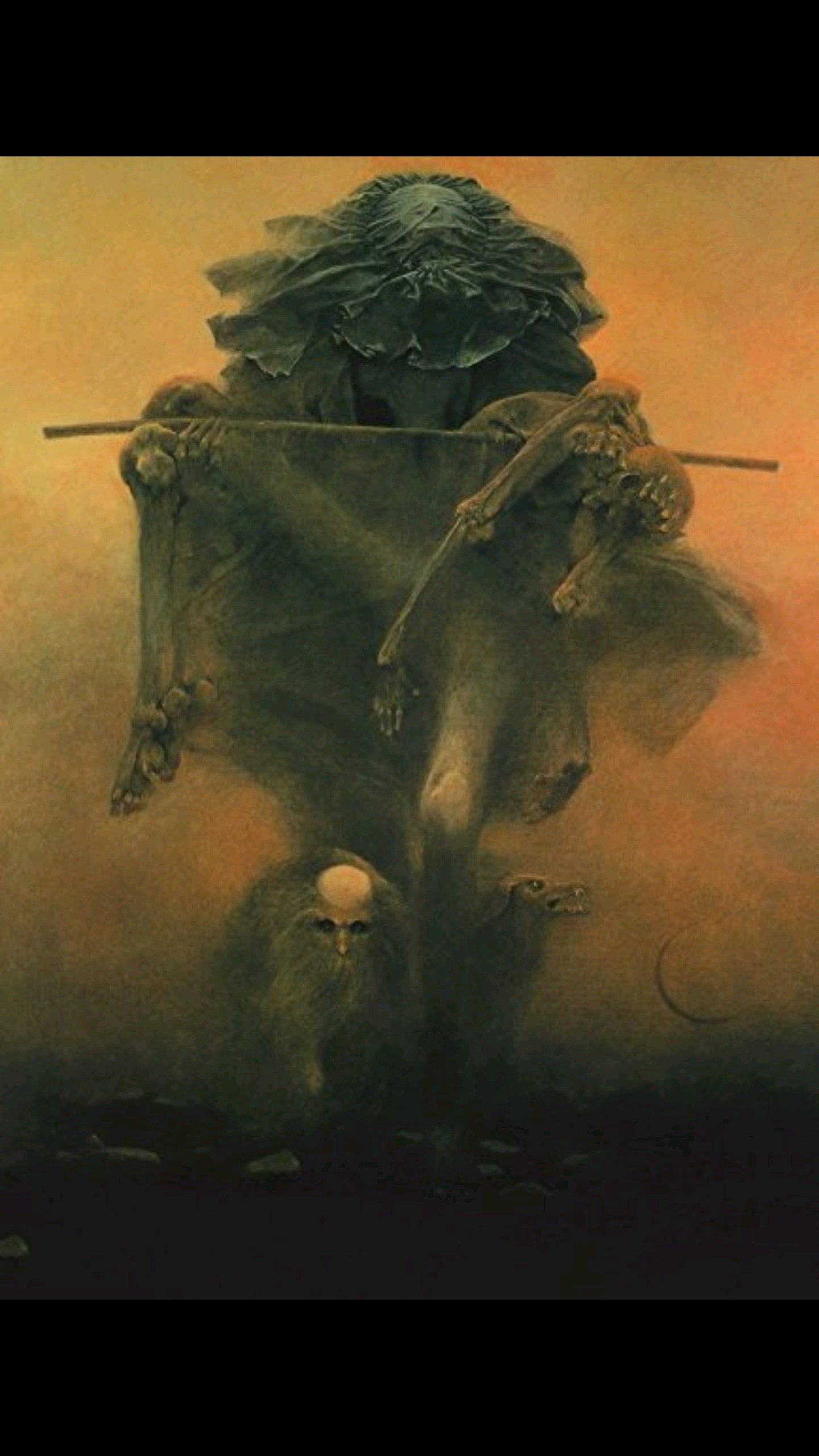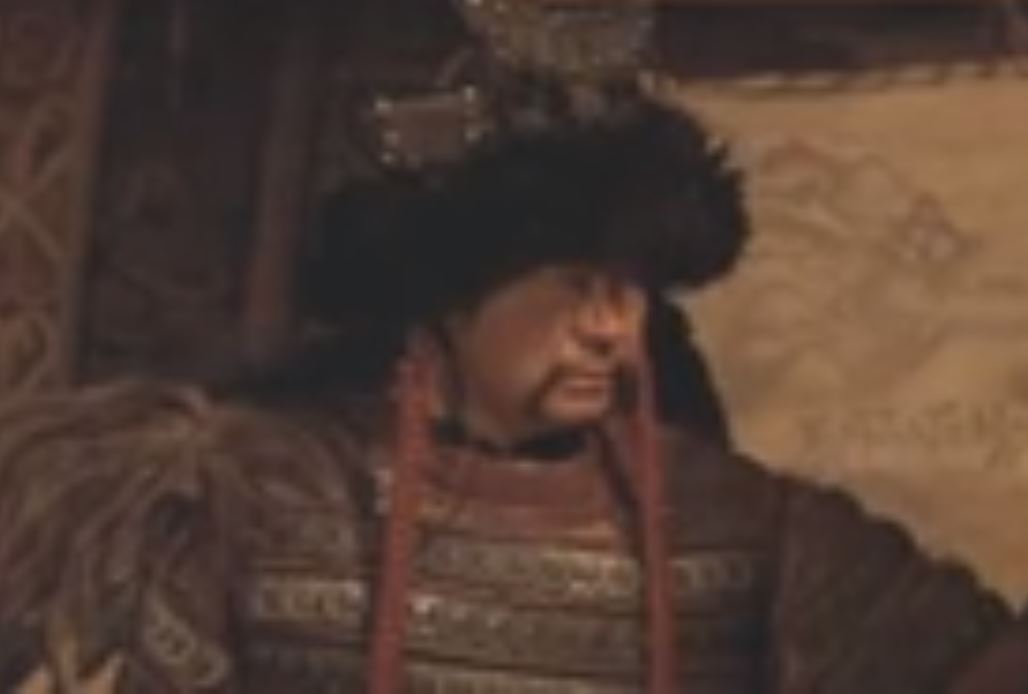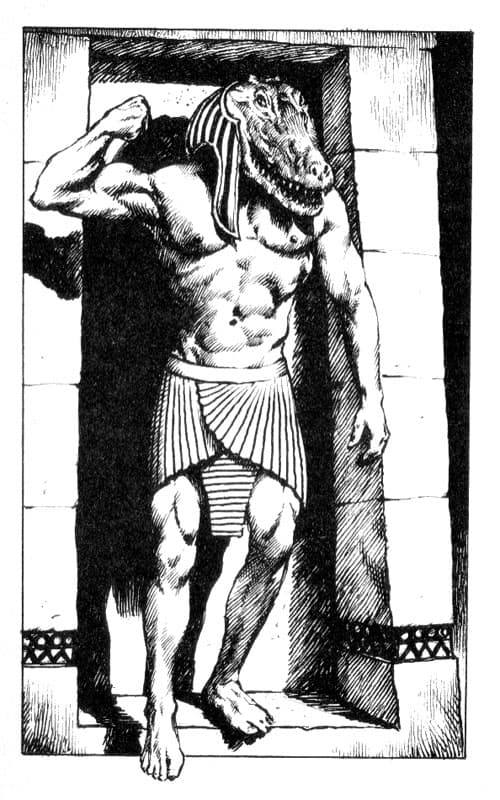Kalon: Difference between revisions
No edit summary |
No edit summary |
||
| Line 4: | Line 4: | ||
[[Image:Kalon.jpg|thumb|right]] | [[Image:Kalon.jpg|thumb|right]] | ||
[[Image:KahnSai.jpg|thumb|right|300px]] | |||
[[Image:croc-god.jpg|thumb|right|300px]] | |||
[[Djall]] is an ancient god. One of the first. Humans know very little about the god, as he largely reigned at | [[Djall]] is an ancient god. One of the first. Humans know very little about the god, as he largely reigned at | ||
Revision as of 11:14, 18 July 2018
Played by Blair in Warlocks...
Djall is an ancient god. One of the first. Humans know very little about the god, as he largely reigned at
the beginning of the universe, long before the written word. Humans have delineated bits and pieces
about the god from archaeology and the study of linguistics. His (?) story lives on in the lesser and later
gods that arose in his place.
He is known to have arisen into the collective consciousness of the first humans to roam Kara-Tur, as they began to realize that there is more to the universe than what they could see. That there was plenty more to be afraid of. First, he was their God of the Unknown, the most basic, visceral fear. True fear that is then parsed out to more concrete conspirators, such as lack of food, raging waters, fierce beasts and, of course, death and the afterlife. As human religions, philosophy and culture “grew up” and gained in complexity, Djall took a more precise form in the minds of humans. He was male, malevolent and the father of death, afterlife and dark energy. The first antagonist. The primeval opponent. The father of the Giants in northern mythologies, Titans in Talathesian pantheons. The quiet, uninvolved, brooding master of all things dark. Coincidentally, this is the closest that humans came to the true nature of Djall.
As time went on, the “second generation” gods gave way to the much more refined beings that were needed to attend to the complex societies of humans developing on the common plane. Djall faded into the backround. Dissipating into the night to ignore the insignificant webs of human consciousness, and slumber until he would again arise when needed to lead the forces of darkness. But, demon memories travel much further back in time and can give us a clear picture of the first lord of evil. The personification of chaos, the void. The demonic histories can almost be called diaries as many of the writers of these histories were eye-witnesses and co-conspirators. However, their reports, by nature, are dubious, self-serving and should always be considered to be heavily biased. If one were to visit many different demon ”schools of thought” (a perilous endeavor, to be sure), one could conceivably piece together a reasonably accurate and highly detailed picture of all time. What we can glean from various demonic reportings, about Djall, are similar to what those clever humans came up with.
As the universe came into being, and the various energies and matter swirled around haphazardly, positive and negative split apart and began coalescing. Djall is the later name of the general mass of negative energy at the beginning. The very base of all that is dark and evil in the universe(s). A formless, at first conscious-less, cloud of evil. Chaos, the Void.
As time went on, the first deities were created out of the ether and energies. Djall took a form, a consciousness and a name. Then began creating the first evil gods and armies of demons to carry out his will. He is the first and only adversary, taking on many names and titles: Satan, Ba’al, Shaitan, Shadow King, Kali, etc. Djall was more involved in human affairs than was thought by humans themselves. However, as time went on his interference did wane, as the complexities of demon, angel and human histories intertwined. He receded into the backround and tended to his universal framework of negative energy.
Of late, several lesser demon lords have endeavored to upend the existing demon hierarchy by reviving Djall, bringing him to the fore and gaining control not only of the hellish planes but the planes of reality and good, as well. Ambitious, and likely doomed to failure, even if they can woo Djall to their side. There must always be balance. This cadre, the Covenant of Djall, is particularly evil, but highly organized with specific goals. Making them the bizarro lawful evil beings attempting the control of the personification of chaotic evil.
To help them forward their nefarious desires on the planes of reality, they have devised a covenant of lich-kings and lich-wizards. Besides creating and maintaining conduits between the planes, these nearly godlike undead mages have been instrumental in carrying out the Covenant’s will and building armies of the undead to sweep across the lands and worlds of the living when Djall returns to rule the universe. The Covenant is, by no means, a singular entity. Many of its leaders, in the real world and in the nether world, are enemies. To date, many of the wars have been undead vs undead. And woe to the living that have been innocent bystanders. The hope is that Djall will have the charisma to hold these disparate parts together.
Into this fertile scenario, enters our anti-hero, Kalon (formerly Stjepan Shishmonglu), a talented and scholarly mage with a singular desire to join the ranks of lich overlords of Djall. Kalon is an ancient Talathesian (Greek) word for summoner. His current abode is a desolate, long unused watchtower on a lonely windswept flank of The Spine. Where, left to his devices, he studies demon and human histories and the arcane art of lichdom. When not buried in a tome (get it?), he is honing his skills as a summoner of demons and the undead.
I would like to say that young Stjepan had a horrible childhood, pulling the wings off of flies and getting molested by the scullery maids. But he had a relatively uneventful childhood in a middle-of-the-road aristocratic household outside of Talathese. He had a few humorous clues to his magery skills during his childhood, and he always had what some would call the Gift. He communicated with the dead as a child, becoming a local celebrity by communicating with recently departed loved ones for various people. It was quirky and harmless. He was not even bullied over it, as he was considered special by most of the populace.
His father was a military adjunct of the Talathesian army, involved in logistics. He had made a small fortune as an army quartermaster. When Stjepan was a young adult he chose college over the military and the temple, as he was not in line for his father’s title. He had proven himself a more than capable history student, when his uncle, Dagobert the Usurper, his father’s younger and somewhat morally bankrupt brother stole the families’ riches, including his father’s, in his bid to usurp the Quiquampoix seat of power. Stjepan could no longer afford to stay in the university and, with nothing, was left to his own devices. A serious illness, the loss of connection to his family and several years on the streets of Talathese brought Stjepan to the bottom, and a clear understanding of the depths to which humans are willing to go. He was plucked from that miserable end by, Archebulus , a mage that recognized his talents with the dead before Stjepan joined them himself. Taken on as an apprentice, Stjepan, excelled at his studies and took to the same path as the mage. He discovered an affinity with the dead.
Archebulus was a lawful neutral mage that had an intense curiosity of the barrier between the living and the dead. He knew that Stjepan’s innate talents and ability to concentrate would make him a formidable summoner. But Archebulus was a staunch believer in not interfering in an individuals personnel philosophy(ies). He could see Stjepan’s fall into the darkness, but did nothing to slow it. Everybody was absolutely solitary in finding one’s destiny, according to him. As Stjepan gained power and knowledge he also was inextricably drawn to darkness, evil and his path into it. On a trip to a demonic plane, Stjepan met his fate, a disciple of Djall, Rhadamanthus, a demonic judge of the dead. He took Stjepan under his wing, and blessed him with the ability of Possession. Possibly to be groomed to become a lich lord, Rhadamanthus’s lich lord, to be used against his fellow Covenant partners. He sent Stjepan on a quest where he ran afoul of a god of the dead and opponent of the Djall cabal, Mot. Mot did not kill Stjepan but cursed him with Unhealing that can only be healed by a vampiric bite. Upon his return to the present plane, he was to be known only as Kalon, and was fully indoctrinated in darkness.
Kalon continued to study with Archebulus, travel to the demonic plane, where his time was largely spent perusing demonic libraries, and practice summoning. But he kept his designs to becomea lich from Archebulus. He met Academis in a couple secret mage libraries, engaging in heated but respected debate over various subjects. He also came to hate the Black Ether, finding them boorish, tunnel- visioned and sometimes just plain ignorant.
Then one day, on a nice afternoon stroll through Tartarus, Archebulus met his demise and Kalon barely escaped with his life…and the Djall Crozier. He was allowed to keep the Crozier on his own plane, but he was exiled from the demonic planes (likely there is an ulterior motive here, but demons are rarely genuous). As an apprentice but not legal partner, Kalon, was not allowed any of Archebulus’s property. Once again on his own, Kalon kicked about for awhile before securing his current isolated home and library. And, to feed his hunger for the history of magic, he secured a position with the Iron Circle, where his skills have become crucial to the mission there, and allows him enough privacy to continue his quest to become a lich.


